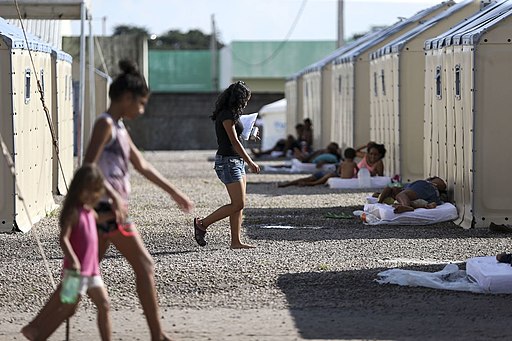By João Jarochinski Silva*

Venezuelan refugees in Boa Vista, Brazil/ Wikimedia Commons/ Creative Commons License
Brazil’s decision to welcome Venezuelan refugees is based on political calculations — part of President Jair Bolsonaro’s domestic agenda, anti-Maduro policies, and efforts to polish his international image — while asylum-seekers of other nationalities are getting a distinctly colder shoulder. The country’s National Committee for Refugees (CONARE), which includes representatives of the Executive Branch and civil society, granted refugee status to approximately 37,000 Venezuelans between December and January. As permitted by Brazilian law, CONARE granted them prima facie refugee status — by virtue of the serious and widespread human rights violations in their home country — without requiring individual interviews. It was an unprecedented number, with strong support from the government, and responded to appeals from civil society and academic experts.
- While the number of Venezuelans in other South American countries is greater, Brazil now has the most officially designated refugees. It previously had only a little more than an estimated 5,000 refugees of all nationalities — one-eighth its current total.
- A generous refugee policy has been a key element of Brazilian foreign policy since the 1990s, often the subject of officials’ speeches in UN contexts. The current Administration’s rhetoric, however, has been different. While visiting India in 2019, Bolsonaro criticized a Brazilian law passed in 2017 (when, he claimed, he was the only deputy to cast a dissenting vote) that liberalized the country’s policies toward migrants — constituting a law in which foreigners would not be seen as threats to Brazilian society and also impacted the reality of refugees.
The recent decision to accept tens of thousands of Venezuelans appears motivated by the Bolsonaro Administration’s opposition to Venezuelan President Maduro — as well as Brazil’s left-leaning parties — more than by the humanitarian ideal of helping people fleeing crisis.
- The Ministry of Justice has argued that non-Venezuelan arrivals are a security threat and need greater control. It introduced a legal regulation that increased control and facilitated the expulsion and deportation of foreigners, with some provisions that specialists claimed to be contrary to Brazilian laws. The regulation was revoked but made clear that the agency will continue to emphasize the security dynamic created by the entry of foreigners.
- Minister of Justice Sergio Moro recently sent a message on social media stating that “Brazil will no longer be a refuge for foreigners accused or convicted of common crimes” [emphasis added]. With prior approval of CONARE, he rejected an appeal by three Paraguayans, who received refuge in Brazil in 2003 but were recently facing removal, and maintained the revocation of their refugee status.
- Critics cite Moro’s use of social media to announce a technical decision as confirmation that his intention was primarily political. They note the ideological affinity between the current Brazilian and Paraguayan governments as being more important than the asylees’ previously determined well-founded fear of persecution — a violation of international law regarding non-refoulement. Critics also point out that the three Paraguayans were politically active with left-leaning groups opposed to Bolsonaro.
The contrast between the government’s and Moro’s attitudes toward asylum-seekers from Venezuela and elsewhere is striking. When confronted with evidence of rising crime by Venezuelan arrivals along the Brazilian border, the Minister said local authorities’ evidence was inconclusive. Bolsonaro’s supporters in the border state of Roraima protested Moro’s statement, but a subsequent decision to close the border for 15 days to foreigners without a permanent residence permit — allegedly in response to the threat of coronavirus — has calmed their concerns.
The CONARE decision on Venezuelans may have been intended in part to remove a glut that had slowed the entire refugee system, but the disparity in the treatment of asylum-seekers primarily reflects Brazil’s deep political polarization. Government discourse portrays its domestic opponents as being irresponsible leftists akin to Venezuelan President Maduro, who is so bad that starving refugees show up on Brazil’s doorstep, while praising rightist governments, to which even 17-year asylees can be repatriated without concern for their treatment. The Brazilian military’s deep involvement in operations regarding Venezuela also incentivizes civilians to help keep the status of refugees from becoming a political embarrassment.
- Politicization of refugee policies and implementation is not unprecedented in Brazil. CONARE, the Brazilian government, and, indirectly, the UNHCR will determine how long this trend will continue. Altering Brazilian action to meet current political interests weakens the rights of refugees and related protective principles embodied in the Constitution and legislation.
March 23, 2020
* João Jarochinski Silva is a CLALS fellow and professor at the Universidade Federal de Roraima (UFRR).

stephanie peralta
/ March 23, 2020The last paragraph hits it home, thanks for a great Monday read